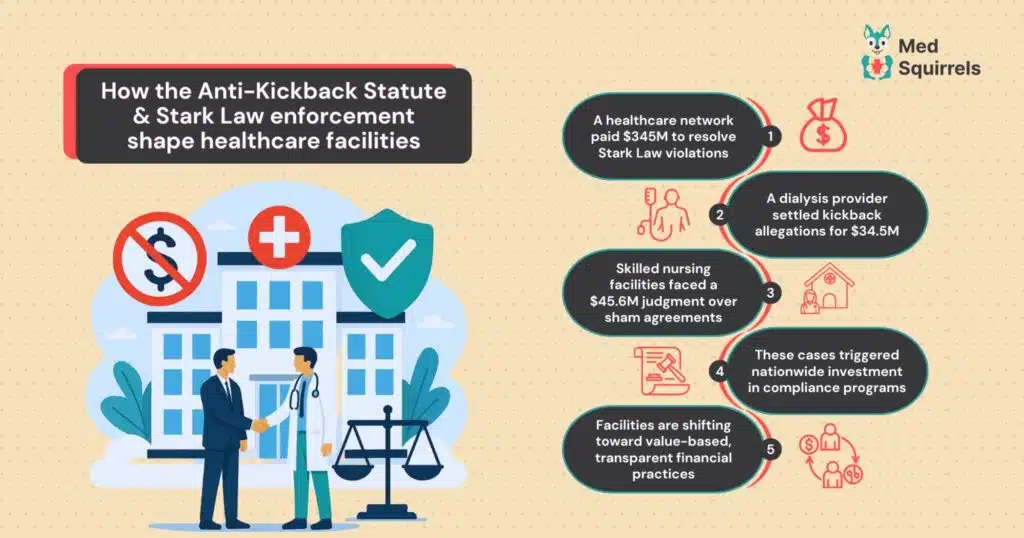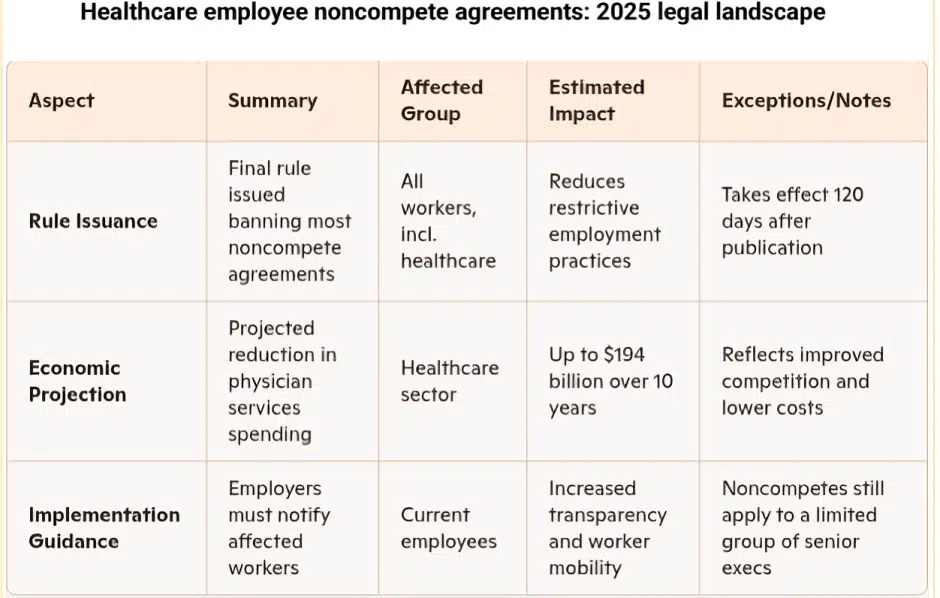Top employment laws every healthcare facility should know in 2025

The legal and regulatory environment affecting healthcare employment in the United States is rapidly evolving. For healthcare facility administrators, human resource professionals, and compliance officers, it is critical to stay up-to-date with regulatory changes. The introduction of new regulations with enforcement from federal and state agencies means that the risks associated with not complying are at an all-time high.
This blog post discusses the five most significant healthcare-related employment laws that healthcare facilities must be aware of in 2025. It provides an overview of implications, action items, and what the laws mean for its employees and operations.
Understanding the Anti-Kickback statute and Stark Law in healthcare
In healthcare, referrals should never be influenced by financial gain. The Fraud & Abuse Laws prohibits offering, paying, soliciting, or receiving any form of payment to induce referrals of services covered by federal healthcare programs like Medicare and Medicaid. The Stark Law , meanwhile, specifically bans physicians from referring patients for designated health services to entities with which they have a financial relationship unless a legal exception applies. Both laws are designed to prevent conflicts of interest and ensure ethical, transparent care.
Violating either law can result in significant penalties, including fines in the millions, exclusion from federal healthcare programs, and even personal criminal charges for providers or employers.
Healthcare employers must be diligent about any service contracts, incentives paid to providers to refer patients, or how they reward referral relationships. With more enforcement action in 2025, exercising due diligence regarding internal controls, training programs, and refreshers will be critical.
To maintain compliance and avoid violations, facilities should take the following actions:
- Regularly review contracts for services and remuneration of providers to ensure they don’t include inappropriate incentives.
- Provide training for staff about the legal limits of financial relationships under these laws.
- Regularly review referral sources to identify unusual patterns, outliers, or red flags that may indicate non-compliant practices.

Stricter HIPAA & Data Privacy Compliance
With cyberattacks against healthcare facilities becoming more frequent and severe, stricter New HIPAA Regulations HIPAA security rule updates are being implemented throughout 2025HIPAA security rule updates are being implemented throughout 2025. These updates include shorter breach recovery timelines, expanded encryption requirements for various communication channels, and significantly higher penalties for non-compliance, up to five times greater than before.
Protecting patient data is no longer just an IT concern; it is a federally mandated legal obligation for all healthcare staff. Both administrative and clinical teams must receive updated training on proper data handling practices across departments.
Facilities that fail to invest time or resources into cybersecurity risk losing access to approved funding programs, including government grants. With increased legal obligations and rising liability costs, remaining compliant and informed on current healthcare HR compliance standards is not optional—it is essential for operational integrity.
Key action steps healthcare facilities should implement include:
- Conduct risk assessments on a given cadence and review the systems’ conduct according to their policies.
- Use two-factor authentication and encryption when data allows.
- Provide HIPAA or Privacy Training across departments.
For a deeper dive into common compliance risks and practical ways to address them, read our detailed guide on healthcare staffing compliance challenges and how to overcome them.
Protections on overtime and working hours
A change in legislation in states like Washington increased protections on mandatory overtime for groups like nurses and allied healthcare workers, which has brought about a significant change in awareness of burnout affecting our workers (not to mention its cascading effects and negative effects on patient care). Scheduling staff, in consultation with employees, for healthcare establishments should include awareness of relevant legislation affecting labor laws for healthcare workers.
This means adjusting your scheduling tools, not scheduling last-minute changes, and setting clear boundaries on your working hours, etc. This sounds like good staff well-being practices, but they also help reduce legal exposure of your workplace under the currently legislated labor laws in the USA.
- Review all of the positions in your schedule to decide what is exempt and what is not. Then make the changes to your scheduling system and also your scheduling policy.
- Log hours and provide compensatory time off if applicable.
Paid family & medical leave (PFML) expansion
In 2025, more states will be enhancing PFML programs, giving employees more flexibility and benefits for life events. If employees are able to apply for PFML prior to taking leave, HR needs to offer additional planning.
These ongoing developments are put in place to increase stability in the healthcare workforce since many sectors see high turnover rates. To remain compliant, facilities must adjust their internal policies as well as ensure clear knowledge of employee rights as laid out in options under employment law in healthcare. To stay compliant and improve care quality, facilities should follow reliable strategies to hire allied healthcare professionals, especially roles like medical assistants, who are in high demand and require both speed and accuracy in staffing.
Also read: Hiring medical assistants: legal and regulatory considerations
Key action steps for HR and compliance teams include:
- Align facilities’ internal policies with changing state legislation
- Train HR staff on all application timelines, as well as the benefits
- Communicate all leave requirements to employees
2025 changes to noncompete agreements for healthcare workers
The FTC and several state governments have limited or outright banned noncompete clauses for healthcare workers. Generally, noncompetes over one year in duration and post-employment noncompetes are no longer enforceable. These legal developments foster workplace mobility and promote fairness from competition in the sector.
Healthcare employers should take the lead in reviewing limits and concentrating on retention strategies that employ nonrestrictive alternatives such as benefits, career development, and mentorship to enhance retention instead of restrictive contracts. Following recent healthcare labor laws is key to attracting and retaining valuable staff.
Actionable steps healthcare facilities should follow include:
- Review all employee agreements for compliance
- Use confidentiality and non-solicitation clauses in place of noncompetes
- Provide complex incentives that engender allegiance and promote work engagement

Source: www.asnc.org
Medsquirrels: The smarter alternative to traditional healthcare staffing
As healthcare employment laws evolve, traditional staffing agencies often struggle to keep pace. Many lack real-time compliance tracking, are slow to adapt to updated healthcare labor laws, and still rely on outdated paperwork-heavy systems. They typically do not offer tailored legal updates or built-in regulatory support, leaving healthcare facilities to manage compliance risks on their own. This not only puts your facility at legal risk but also delays hiring and drives up costs with high agency markups and opaque fee structures.
MedSquirrels offers a smarter alternative. As an AI-powered healthcare staffing platform, MedSquirrels ensures that every hire is aligned with current healthcare employment laws, from HIPAA compliance to PFML updates and overtime regulations. Unlike traditional agencies, our platform automates candidate sourcing, credentialing, and onboarding, ensuring end-to-end healthcare HR compliance with greater speed, accuracy, and transparency.
You also gain greater visibility into your hiring pipeline, with real-time progress tracking. This helps reduce delays and improve decision-making at every stage.
Our platform provides three flat-fee plans designed for every hiring need: the Orange Plan offers full-service support, including EOR/payroll, the Purple Plan supports seamless payroll when you have already selected a candidate, and the Blue Plan delivers targeted recruitment-only assistance. Facilities can compare MedSquirrels pricing through the platform and stay ahead in cost efficiency. Book a free demo and experience a smarter, law-ready way to hire.
FAQs
What are the most important healthcare employment laws in 2025?
In 2025, key healthcare employment laws include HIPAA updates, overtime regulations, anti-kickback statutes, PFML expansions, and noncompete clause reforms. These laws significantly affect how facilities hire, manage, and retain healthcare staff in a compliant and efficient way.
How do HIPAA changes affect healthcare facilities this year?
HIPAA updates now require stronger encryption protocols, faster breach recovery, and stiffer penalties for non-compliance. Facilities must invest in advanced cybersecurity systems and consistent staff training to avoid regulatory risks.
Are non-compete agreements still valid for healthcare workers?
Many states and the FTC are restricting or banning noncompete agreements, especially those lasting longer than one year or applying post-termination. Employers should now focus on alternative, retention-friendly strategies like benefits and career growth.
What makes MedSquirrels better than traditional staffing agencies?
MedSquirrels offers transparent, flat-fee pricing and faster candidate placements. It’s built for modern healthcare staffing needs with integrated AI technology.
Can I use MedSquirrels for both full-time and contract hires?
Absolutely. MedSquirrels supports both full-time and contract hiring models while ensuring all documentation aligns with the latest healthcare labor laws for seamless legal compliance.
Jani Basha is a healthcare content expert at MedSquirrels, sharing insights on staffing trends, hiring best practices, and career growth.
